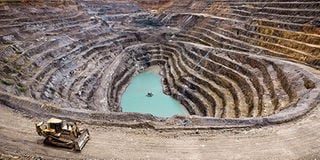Kenya linked to illegal exports of uranium to Iran

File | DATION
A copper mine in Kolwezi, Katanga, DR Congo.
The United States suspects that Kenya and Tanzania have been used to smuggle uranium for Iran’s controversial nuclear project.
Leaked embassy cables identify the Democratic Republic of Congo as the source of the mineral, which once refined can be used in reactors to generate electricity or in making bombs.
DRC has extensive deposits of high grade uranium ore. The embassy cables from Kinshasa and Dar es Salaam suggest that the uranium is mined in the Katanga province by foreign firms before being shipped to Iran through East Africa.
The Chargé wd’Affaires at the US mission in Dar es Salaam, Mr Purnell Delly, told his superiors in Washington in September 2006 that it was “common knowledge that uranium shipments were passing through the port of Dar es Salaam en route to Iran”.
Two years ago, the Kenya Police intercepted what was suspected to be uranium smuggled from the DRC by Ugandan and Congolese nationals. The material was found to be highly radioactive. The two men had bought it in DRC at Sh3.9 million and planned to sell it in Nairobi for Sh100 million.
In May this year, police seized 10 kilogrammes of a substance thought to have been uranium, sparking an international alert that Kenya was being used by international traffickers as a transit point for uranium smuggled from the DRC.
The US believes that Tehran’s nuclear programme is aimed at producing a nuclear weapon while Iran insists it is intended for peaceful use.
As recently as August, Tehran announced that it had started building the first of 10 new uranium enrichment plants in protected mountain sites, defying international efforts to rein in its programme.
The British newspaper The Guardian, quoted Ali Akbar Salehi, head of the Atomic Energy Organisation of Iran, as well as a vice-president, saying that the search for sites for the facilities had ended.
“Finding the location for the construction of 10 more uranium enrichment plants in Iran is over now,” Salehi told the broadcaster IRIB. “The construction of one of these sites will start by the end of this [Iranian] year [March] or the beginning of the next year. The new enrichment facilities will be built inside mountains.”
In July, the UN imposed a fourth round of sanctions against Iran because of fears that it may be secretly developing nuclear weapons. The US and Israel have both refused to rule out military action against Iran.
A leaked cable quotes a Swiss diplomat claiming that East Africa is a major transit point for smuggled Uranium.
“According to a senior Swiss diplomat, the shipment of uranium through Dar es Salaam is common knowledge to two Swiss shipping companies,” Mr Delly wrote.
“Hans Peter Schoni, Counsellor at the Embassy of Switzerland in Tanzania, referred to the allegations of uranium from the Democratic Republic of Congo (DRC) passing through Zambia and Tanzania en route to Iran, but did not attribute to the shipping companies any opinion of the source or destination of the alleged uranium,” the diplomat went on.
He said that he had shared his concerns with all “relevant agencies” but that they had been unable to confirm or deny reports of uranium shipments.
Mr Delly’s fears are corroborated by the US diplomat in Kinshasa, Dpopovich Econoff, who in secret cables written in November 2007 said that there were large quantities of uranium in DRC.
“It is unclear whether or not Malta Forest and other companies in Katanga Province mine and traffic uranium. A body of circumstantial evidence exists, but specific hard evidence does not,” Mr Econoff reported.
“Certainly, there are extensive, probably profitable, quantities of uranium in Malta Forest’s mines, especially since the price of uranium has increased from approximately $15 a pound in 2004 to $135 a pound in 2007,” he explained.
According to the diplomat, uranium is mined in large amounts by companies owned by or with connections to powerful Congolese government officials and smuggled out of the country through an intricate and corrupt system.
Malta Forest, with links to an advisor to President Joseph Kabila is one such company. Swiss and Finnish companies also have massive interests in mining in Katanga, the cables reveal.




